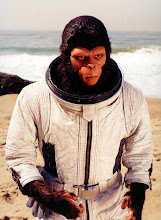Just saw INCEPTION for the 2nd time. After my first viewing I jumped on the internet to gauge the collective "buzz", in what way the INCEPTION meme was inserting itself into our social consciousness. Most people reacted as I did - completely blown away. Others, not so much.
Not everyone's going to agree, I understand that. And INCEPTION isn't a perfect movie, even I can admit that. But I've seen a lot of screenwriters and industry folk take a lot of shots at this film, and for that, I'd like to take a shot at them.
Is the film to long? Does it make perfect narrative sense? Does it break cardinal rules of screenwriting? Is there too much exposition? All fair questions, but while we're pondering those, why not ponder some of these questions:
Aren't you sick and tired of sequels, movies based on video games, board games, comic books, old T.V. shows and Y.A. novellas?
Aren't you sick of Big Hollywood using their resources to pander mostly to children, rednecks and illiterates? Aren't you sick of them insulting your intelligence - and CHARGING you for it?
Don't you wish studios would spend more time and money producing original stories and spec scripts instead of the above? Wouldn't you like some of that money to go towards smarter films, the kinds of films YOU'D like to write and see?
When you pay to see a film, don't you want to walk out feeling you got your money's worth and then some?
Wouldn't you like to see the creativity and passion of the filmmakers pour through every frame, instead of the current paint by numbers esthetic?
Don't you want filmmakers to EARN your time by packing their film with action, depth, comedy, pathos, intelligence, creativity and interesting characters? Do you want to be shown a unique and complex world like none you've seen before?
Do you want your filmmakers to take narrative and stylistic chances?
If these are among the attributes you look for in a film, you know such films are increasingly rare. Especially in today's marketplace. So why on earth - when we so lament the absence of quality films, intelligent original stories geared towards an adult audience - why is it when we receive such triumphs as Inception do some people find the need to nitpick the thing to its grave?
Nolan worked his ass off on this film, and it shows in every frame. His camera is impeccable, his cast is sublime, the music is epic, the story is intricate and most of all, original. Here is a film which instead of talking down to its audience (see Despicable Me), actually challenges us to intellectually engage on a level we've rarely experienced before. Why begrudge Mr. Nolan for that? If INCEPTION is the ONLY adult oriented major budget action thriller around and we'd like more of those types of films, then why nitpick?
Maybe it's that disgusting internet disease, you know, that urge for everyone to bash everything regardless of its quality or whether they could do better? I read a particularly puffed-up, know-it-all post pointing out INCEPTION'S flaws, a post from a professional Hollywood writer. Needless to say, when I looked up that writer's credits - well, let's just say they were less than stellar. Shame on you, for your films and your attitude.
If we want better films, original films, films adults can watch and be engaged and swept away in, why bitch about INCEPTION? Surely there are other films out there who actually deserve the ill will? All you need to do is sniff most of this year's titles. There should be a sign posted above the info superhighway entrance that quotes mom's "If you can't say anything nice..." bromide, people on the net seem to be the antithesis of that sentiment (internet code of conduct seems more akin to "Flay the fuckers).
To get on screen what Nolan has is a herculean effort - especially in today's marketplace, and he's done an amazing job as a filmmaker and story teller. Any filmmaker/writer would be lucky throughout the span of an entire career to score a Memento, a Dark Knight or an INCEPTION. Nolan has all three, and his career is still in its infancy. What that says to me is to pay attention, for we are in the presence of one of the all time great filmmakers. Rather than nitpick his shortcomings, I think I'll sit back and bask in the sheer brilliance of this man.
So a big THANK YOU to Christopher Nolan from yours truly for all your hard work. I, for one, will be eternally grateful for the gift of INCEPTION. And in my opinion those who underestimate Mr. Nolan's artistic achievement simply need to... well... wake the fuck up.
PS - for those who haven't seen the film, I wouldn't watch the following trailer; one of the beauties of INCEPTION'S concept and pre-release marketing campaign is the fact that the original trailers gave away very little - actually none - of the story. This made for a wonderful viewing experience since everything in the theater was a surprise.
9 years ago
